The eurozone informal Council - a weissbier for Ms Merkel
Ralitsa Kovacheva, March 14, 2011
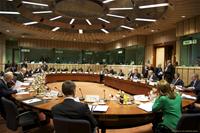 The leaders of the eurozone have agreed an important compromise regarding the rescue fund for the euro area, which will from now on be able to lend at a lower price and will be able to buy up government bonds at the primary market places. The leaders have also endorsed a Pact for the Euro, although it is much softer than the initial proposal of France and Germany, laying the foundation of a stronger political and partner control in the Monetary Union.
The leaders of the eurozone have agreed an important compromise regarding the rescue fund for the euro area, which will from now on be able to lend at a lower price and will be able to buy up government bonds at the primary market places. The leaders have also endorsed a Pact for the Euro, although it is much softer than the initial proposal of France and Germany, laying the foundation of a stronger political and partner control in the Monetary Union.
The expectations from the summit were not high, which is why the decisions cause a surprise. The context in which these decisions have been taken also cannot be ignored - the extraordinary European Council on Libya and the devastating earthquake and tsunami in Japan, as well as the strong market pressure on peripheral economies, caused by the news of the downgrading Spain's credit rating. I don't know whether euro area leaders worked with a feeling of a world falling apart, which could be felt in the global "infosphere" throughout the entire day, but they were indeed desperate to send a message of stability.
Even the Portuguese government was forced to announce, precisely on Friday, additional measures to curb the deficit, which were announced with pleasure by the Commission and were also mentioned in the conclusions of the euro area leaders. Because it is Portugal that is considered to be the next candidate for a bail-out, and saving Portugal would most certainly focus the attention on Spain.
The rescue fund
Maybe the most unexpected decision is the rescue fund of the eurozone (EFSF) to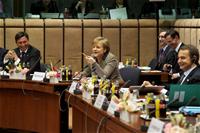 be granted the powers to buy up debt at the primary market places. The condition, however, is that the country in need would have to commit itself to a corrective programme, similar to that for the bail-out schemes. It was expected Germany to be the main opponent of such an opportunity, given that the Bundestag voted on a resolution in the same spirit.
be granted the powers to buy up debt at the primary market places. The condition, however, is that the country in need would have to commit itself to a corrective programme, similar to that for the bail-out schemes. It was expected Germany to be the main opponent of such an opportunity, given that the Bundestag voted on a resolution in the same spirit.
However, Ms Merkel obviously decided that this after all may be allowed to happen but in return for applying the corresponding corrective measures by the country in trouble. Thus the problematic countries will be able to raise funding at a lower than the market price. The fund, though, will be able to buy up debt only directly from the states not via third players at the secondary market places, including from the European Central Bank, as there were such ideas.
The leaders have agreed to increase the EFSF's effective lending capacity to its ceiling of 440bn euro. Currently the fund operates with approximately 250bn euro because it is obliged to maintain reserves in support of its triple A rating. Only 6 countries in the euro area have such a rating and it is these countries that have to increase their share in order to effectively widen lending capacity, most of all France and Germany. According to European Council President Herman Van Rompuy, by the next European Council meeting on March 24th and 25th, the ministers of finance have to propose specific ways to increase the effective lending capacity of the fund.
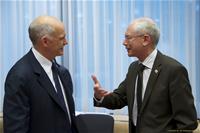 Another important decision is that "pricing of the EFSF should be lowered to better take into account debt sustainability of the recipient countries [of financial aid], while remaining above the funding costs of the facility". In this context the interest rate of the Greek loan has been reduced by 1% and its maturity prolonged to 7 and a half years. The conditions are Greece to continue with structural reforms, to quickly complete its privatisation programme, worth 50bn euro, and to introduce a strict and solid fiscal framework at the strongest possible legal basis.
Another important decision is that "pricing of the EFSF should be lowered to better take into account debt sustainability of the recipient countries [of financial aid], while remaining above the funding costs of the facility". In this context the interest rate of the Greek loan has been reduced by 1% and its maturity prolonged to 7 and a half years. The conditions are Greece to continue with structural reforms, to quickly complete its privatisation programme, worth 50bn euro, and to introduce a strict and solid fiscal framework at the strongest possible legal basis.
The same deal was offered to Ireland, but under the condition the country to increase its corporate tax. The newly elected prime minister of the country, Enda Kenny, though refused to take the offer. The corporate tax of 12.5% was the stumbling block during the negotiations on the Irish bail-out from the EU and the IMF, as the previous government succeeded in securing keeping the tax rates by explicitly enshrining in its 4-year budgetary strategy that the corporate tax would not be increased in any circumstances.
European media note that there was heavy fighting on the issue between the 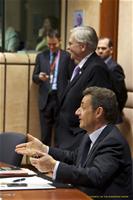 Irish premier and French president Nicolas Sarkozy, who is reported to have told directly to Mr Kenny: "So we're supposed to give up millions and you're not even willing to talk about taxes?!" Enda Kenny, who has been a prime minister for only several days and this was his first meeting with his euro area colleagues, is facing a significant test because reducing the interest rate on the loan was the main election promise of his party Fine Gael, but keeping the low corporate tax rate is a matter of national honour for the Irish. Mr Kenny has received a deadline - by the European Council on March 24 and 25 to consider the offer.
Irish premier and French president Nicolas Sarkozy, who is reported to have told directly to Mr Kenny: "So we're supposed to give up millions and you're not even willing to talk about taxes?!" Enda Kenny, who has been a prime minister for only several days and this was his first meeting with his euro area colleagues, is facing a significant test because reducing the interest rate on the loan was the main election promise of his party Fine Gael, but keeping the low corporate tax rate is a matter of national honour for the Irish. Mr Kenny has received a deadline - by the European Council on March 24 and 25 to consider the offer.
A Pact for the Euro
The euro area leaders have decided to adopt a Pact for the Euro, proposed initially by France and Germany under the name of a Pact for Competitiveness. In the new document, however, the changes are evident, made under the pressure of European institutions and single member states. The demands of the Commission and the Parliament the Pct to be incorporated in the existing economic governance of the Union is accepted, together with its tools (Europe 2020, the European semester, the Integrated Guidelines, the Stability and Growth Pact, the new framework for macroeconomic surveillance).
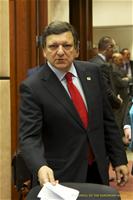 The role of the Commission is underlined as the body that will supervise the implementation of commitments, as well as the European Parliament's role "in line with its competences". The Pact will focus on boosting competitiveness, employment, sustainability of public finances and the stability of the financial sector. For the purpose at a leaders' level the member states (from the euro area and others who want to join) common targets will be put, according to which each country will define national commitments and policies of its own.
The role of the Commission is underlined as the body that will supervise the implementation of commitments, as well as the European Parliament's role "in line with its competences". The Pact will focus on boosting competitiveness, employment, sustainability of public finances and the stability of the financial sector. For the purpose at a leaders' level the member states (from the euro area and others who want to join) common targets will be put, according to which each country will define national commitments and policies of its own.
The member states will have to share best practices and to commensurate their efforts with the best performing countries and strategic partners, the document stipulates. This is a much more advisable formulation than France's and Germany's insistence the best performing country to be the only metrical unit for the rest.
All the objections against the Franco-German proposal of the euro area member states can be seen clearly in the document. It did not allow any possibility for national deviations from the "right path", written in a peremptory tone in the proposal. In its current version the Pact explicitly makes a notion that every country has the right to choose the policies that would help it achieve the common targets and the right not to undertake actions in a certain area if it deems it unnecessary.
The political monitoring of the implementation of commitments will be realised by 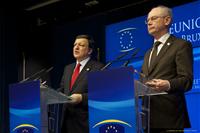 the leaders of the Pact member states annually, on the basis of a report of the Commission. For the purpose concrete indicators will be developed for competitiveness, employment, fiscal sustainability and financial stability. The countries are obliged to consult with their partners before undertaking key economic reforms that could impact the rest of the countries. The document explicitly stipulates that "the Pact will fully respect the integrity of the Single Market".
the leaders of the Pact member states annually, on the basis of a report of the Commission. For the purpose concrete indicators will be developed for competitiveness, employment, fiscal sustainability and financial stability. The countries are obliged to consult with their partners before undertaking key economic reforms that could impact the rest of the countries. The document explicitly stipulates that "the Pact will fully respect the integrity of the Single Market".
Especially interesting are the measures to boost competitiveness, the most controversial ones. As a result the text concerning these measures is the most stream-lined. Special attention will be paid to unit labour costs (ULC) in order to assess whether wages and productivity go hand in hand. Under this indicator each country will be compared to the rest in the euro area and the main trade partners. Based upon this an assessment will be made of the ULC for the economy of every country, as well as per sector. Wherever needed, a review of wage agreements will be made, as well as of the level of centralisation of the agreeing process and the mechanism of indexation. All this, however, will happen only after "respecting national traditions of social dialogue and industrial relations".
Regarding public finances and especially pensions and welfare, the formulation is also quite advisable - reforms could include, as the text goes, for example binding retirement age to life expectancy. Something which sounded much more imperatively in the Franco-German proposal.
The requirement of the so called debt brakes is also dressed in a much broader formulation "translating EU fiscal rules as set out in the Stability and Growth Pact into national legislation", and debt brakes are only one of the opportunities member states could select.
Regarding coordination of tax policies, things too look very broadly. It is explicitly stated that direct taxation remains a matter of national competence, but the countries should commit themselves to "structural debates" on tax policy. France's and Germany's proposal for a common base of corporate taxation, that caused a lot of controversy, is reduced to a clarification of possible advantages and adding that the Commission would present a proposal on the issue in the next few weeks.
Concerning the financial sector, the countries agree to introduce national legislation on banking restructuring, while the level of private indebtedness of banks, households and non-financial firms would be carefully monitored.
The Pact for the Euro will be finally approved at the European Council in the end of March. Then it is expected to become clear which non-euro area countries will join it. According to the EUobserver, Sweden, Denmark, Britain and Poland are expected to be invited to join. Initially Bulgaria announced it was against joining the Pact because of the proposal for a common corporate taxation but it will not be a surprise if, for the conditional and advisable spirit of the document, some countries would change their position. Ultimately, no sanctions and compulsory measures are envisaged in the Pact and control on behalf of the partners will be purely political - a practice that has proved ineffective through the years.
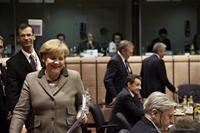 I wonder whether Ms Merkel returned satisfied in Berlin, satisfied to such an extent that to put her feet on the stool and open up a weissbier? It is more likely that she felt a relief in the end of an endless day full of compromises. With a fight to prove who, actually, governs the EU. Lately this question has seemingly replaced even the debt crisis from the spotlights. And is the Pact for the Euro going to work? Well, this depends entirely on member states. After all, the aim of a reasonable statesmanship is not Brussels (or Ms Merkel) to praise you or at least not to sanction you, the aim is citizens to live better but not at the expense of future generations.
I wonder whether Ms Merkel returned satisfied in Berlin, satisfied to such an extent that to put her feet on the stool and open up a weissbier? It is more likely that she felt a relief in the end of an endless day full of compromises. With a fight to prove who, actually, governs the EU. Lately this question has seemingly replaced even the debt crisis from the spotlights. And is the Pact for the Euro going to work? Well, this depends entirely on member states. After all, the aim of a reasonable statesmanship is not Brussels (or Ms Merkel) to praise you or at least not to sanction you, the aim is citizens to live better but not at the expense of future generations.
 Angela Merkel, Emmanuel Macron | © Council of the EU
Angela Merkel, Emmanuel Macron | © Council of the EU Benoit Coeure | © Council of the EU
Benoit Coeure | © Council of the EU Pierre Moscovici | © Council of the EU
Pierre Moscovici | © Council of the EU | © European Parliament
| © European Parliament | © The Council of the European Union
| © The Council of the European Union | © European Parliament
| © European Parliament